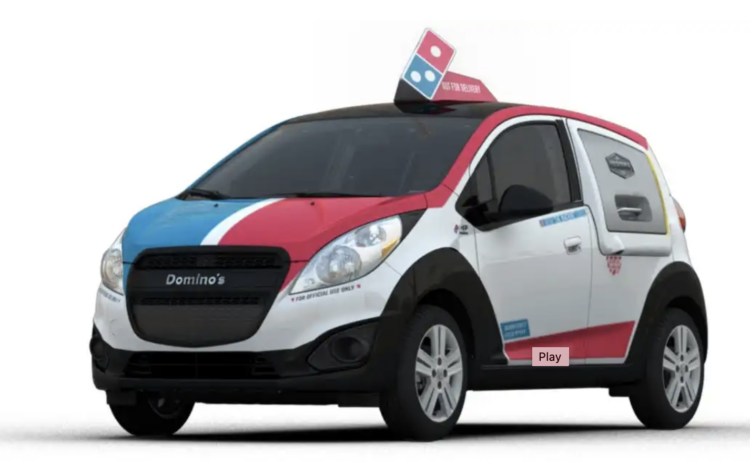
Delivery is booming. Yet there's still no perfect car for its drivers.
This article appeared first in CNN Business on July 27, 2020.
In 2012, Local Motors CEO Jay Rogers was excited to work with Domino’s to build the ultimate delivery vehicle. But soon, things changed, according to Rogers. The ambitions became less lofty, he said. Domino’s decided it would be too expensive to build a vehicle from scratch and was better off spending that money on advertising, he said. Instead, Domino’s opted to modify a Chevy Spark, and it only made 154 of its new delivery vehicle.
Eight years later, food delivery has exploded in popularity during the Covid-19 pandemic. US sales from food delivery apps like DoorDash and Uber Eats have doubled this year. But drivers still rely on passenger cars that aren’t well-suited to haul groceries or sensitive items that need to be kept cold or hot.
There hasn’t been much of a market for a perfect delivery vehicle, as Rogers learned, and businesses are generally happy to try to save money by having workers use their own cars.
A Domino’s spokeswoman declined to comment on Rogers’ remarks aside from saying Local Motors had been a great partner and that some franchises had different views on whether it would be cash-efficient to lease vehicles for drivers.
But there are some glimmers of hope for delivery drivers and customers who want their food to arrive in perfect condition. Joe Furnari, CEO of HyreCar, which rents vehicles to ridehail and delivery drivers, began offering a three-wheeled vehicle called the Arcimoto Deliverator, during the pandemic.
The Deliverator has a single seat and a large compartment for carrying deliveries. The vehicle is about a third of the size of a traditional vehicle, making it easy to maneuver and park on crowded streets. The Deliverator sells for $19,900 and is manufactured in Eugene, Oregon. A driver steers with handlebars similar to a motorcycle.
New demand for cars is coming predominantly from drivers wanting to make deliveries, Furnari said.
He’s had more demand for the Deliverator than any other vehicle he rented. (Furnari said he’s temporarily paused rentals of the vehicle to complete new registration requirements from the California DMV.) The Deliverator is appealing, he said, because there’s no gas to pay for, and the vehicle is the cheapest rental he offers, at about $33 day, including insurance.
“It could revolutionize the delivery sector,” Furnari said. “It has enough space and doesn’t consume a lot of energy.”
Mark Frohnmayer, Arcimoto’s founder and CEO, began designing the vehicle in 2007. He felt it was wasteful to use a 4,000-pound car to drive to get a cup of coffee. He believed he could build a vehicle that filled a gap between a motorcycle and car.
So far Arcimoto has sold fewer than 10 of them. Frohnmayer said he’s had conversations with large food delivery companies, including a launch event with Uber, but had struck no partnerships.
Jim Oboyski, who will soon open a franchise of the burger chain Wahlburgers in Key West, Florida, has decided to give the Deliverator a shot.
Oboyski said he was unhappy with the high price of partnering with delivery services, which can take a nearly 30% cut on deliveries.
Oboyski said he also found the vehicle appealing because it seemed to be a way to ensure food arrives at customers in better condition. He’s planning to retrofit the vehicle’s food storage space with hot and cold compartments to hold burgers and milkshakes.
“You’re not just throwing a bag of drinks in the front seat of an Uber driver’s car, and as he’s going your food is cooling down and your shakes are heating up, everything is melting or getting cold,” Oboyski said.
He also expects the Deliverator will do well on Key West’s narrow streets. Oboyski will be watching closely to compare the financial returns of having his own delivery vehicle, rather than using an outside service.
As for Rogers at Local Motors, he’s hoping to get back into the delivery vehicle world.
“Delivery is so important now,” he said. “I’d love to do it with Domino’s again, and this time actually do it.”


